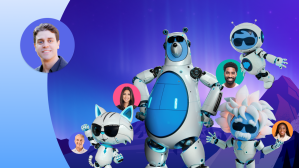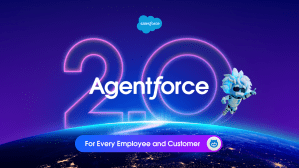Picture this: You wrap up a morning sales call, and before you can even grab a cup of coffee, your AI agent has already summarized the conversation, updated your CRM, sent action items to your marketing colleagues, flagged upsell opportunities, and scheduled follow-up meetings — all without you lifting a finger.
Autonomous AI agents are no longer futuristic figments of your imagination. They’re here, ready to manage simple and complex workflows, boost productivity, and operate as reasoning collaborators, augmenting how we work.
This is a monumental shift — a technology transformation that will reshape how businesses operate, innovate, and bring new products and services to market. In fact, before long, every organization will have entire teams of digital agents working alongside human employees, augmenting their work while dramatically improving customer satisfaction, corporate growth, and profit margins.
This is a monumental shift — a technology transformation that will reshape how businesses operate, innovate, and bring new products and services to market.
Adam Evans, SVP Product, Salesforce AI Platform
None of this was possible just a few years ago. What’s made it real and helped this technology leapfrog the basic AI assistants and copilots that many companies have been using is pioneers like Salesforce that have invested in three key areas as the next wave of AI unfolds: Connecting agents to data and metadata more effectively; delivering a reasoning engine that enables agents to make decisions and act; and helping organizations build customized agents for their unique needs — quickly and easily.
Data: The heartbeat
Data is at the foundation of every AI solution. Consumer AI chatbots, as we all know, tend to hallucinate or make stuff up, in large part because they lack access to good, clean, current, and relevant data.
But by grounding the work that AI agents perform in an organization’s own data — such as CRM records, telemetry data, web pages, PDFs, emails, customer calls, and even video content — we’ve made it possible for them to deliver more informed and valuable insights and recommendations as well as to not only take action, but take the right action. They’ve been optimized to know, for example, what your priorities are when they summarize your meetings, update your CRM, and schedule follow-ups to help you move deals along and get them closed. Similarly, when customers reach out with a product or service question, they have the data and context via metadata to deliver the best possible experiences for them.
Saks Fifth Avenue, for example, is using Data Cloud and Agentforce to create and customize agents, pushing the boundaries of traditional retail experiences. With Data Cloud, Saks is combining data from all systems into a single customer profile, which allows always-on agents to provide personalized recommendations and suggestions based on a customer’s complete sales, service, and commerce history. Customers will be able to use an Agentforce Service Agent to make order updates, like changing the shipping address, freeing up human workers for more complex tasks.
Reasoning: The brains
What sets AI agents apart is their ability to reason, almost like human beings. The Agentforce Atlas Reasoning Engine serves as the brains of an agent using multiple techniques, including advanced retrieval augmentation generation (RAG), to analyze information and determine the next-best actions for completing simple and complex tasks. RAG selectively uses multiple language models to refine the quality of queries, ensuring the retrieval of the most relevant knowledge while also evaluating the quality of the response.
For leading global publisher Wiley, this time of year is their Super Bowl — and they face a massive surge in service requests as millions of students return to school. With Agentforce for Service, Wiley has scaled up its customer service workforce on demand to handle account access issues and triage registration and payment issues, and point customers to the right resources. Wiley customers have commented on both the speed and improved language understanding. Agentforce for Service has helped Wiley see a more than 40% increase in case resolution, outperforming their old technology.
The reasoning engine works within the security guardrails an organization sets, ensuring that proprietary data doesn’t leak into LLMs and rules for detecting toxicity and bias are enforced. In tricky or sensitive situations that call for human attention, the agent will hand off tasks, along with summaries of the situations and recommendations for ways to address needs or challenges, to humans.
Customization: The personality
Agentforce allows any organization to build, customize, and deploy their own agents quickly and easily with low-code tools. Agentforce Agent Builder makes it easy to customize out-of-the-box agents or build new agents for any role, any industry, or any use case using existing tools like Flows, Prompts, Apex, and MuleSoft APIs to configure their agents. Using Agent Builder, organizations can create a job to be done for their agent by defining topics, writing natural language instructions within that topic, and creating a library of actions for it to choose from.
In addition to Agent Builder, Model Builder is used for registering, testing, and activating custom AI models and LLMs. And, behind every generative experience is a prompt. Prompt Builder allows users to easily customize out-of-the-box prompt templates with their own CRM or Data Cloud data to enhance the output of the generated results. It embeds the generative experience in the flow of work.
By refining and adjusting agents, models, and prompts, companies can improve how employees and customers use AI to transform the way we do business. Indeed, imparting knowledge about your specific goals, tasks, and policies, empowers these AI tools to deliver enhanced performance that aligns with any unique company task, action, or request.
Embracing the AI-driven future of work
Chatbots and copilots can’t do that. They can handle a wide variety of general tasks, like generating emails, creating web pages, or responding to a range of frequently asked customer questions. But they rely on human requests and struggle with complex or multistep tasks. AI agents operate autonomously, retrieving the right data on demand, building action plans for any task, and executing plans without requiring human intervention. Like self-driving cars, they’re also able to adapt to changing conditions and operate independently with minimal or no human prompting or oversight.
As we move beyond copilots and chatbots, AI isn’t just handling tasks — it’s recasting how businesses operate.
Adam Evans, SVP Product, Salesforce AI Platform
As we move beyond copilots and chatbots, AI isn’t just handling tasks — it’s recasting how businesses operate. With agents, companies can build digital AI teams on demand that think, act, and evolve alongside humans. Routine, time-consuming tasks will disappear for human employees. Innovation will intensify, and workers will be free to focus on the strategic and creative work that truly drives the business.
The next wave of AI is already leading the way. It’s time to say goodbye to assistants and copilots and embrace the power of autonomous AI agents.
More information:
- Learn more about Agentforce and AI agents
- Discover Data Cloud, the only data platform native to the #1 AI CRM






















